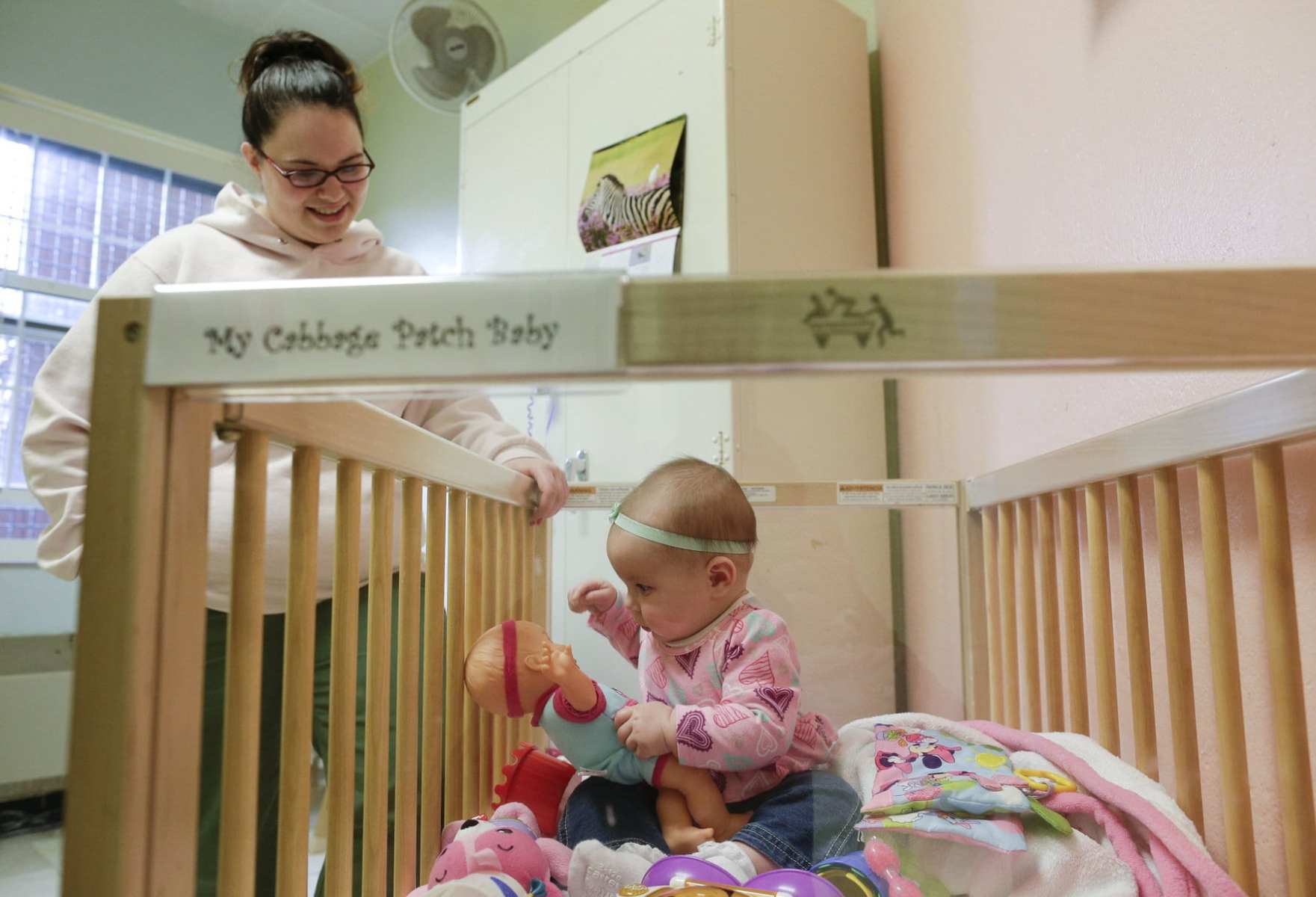In June 2014, Autumn Mason gave birth while incarcerated in Shakopee Correctional Facility, Minnesota’s only women’s prison. She was arrested for criminal vehicular operation at seven months pregnant and had anxiously anticipated the birth of her third child.
“During delivery, you are not allowed to have any visitors, and you’re not allowed to use the phone or make phone calls, so the threat of being by myself was very scary,” Mason said. “I was fortunate to get connected with a doula.”
The Minnesota Prison Doula Project sends doulas and other delivery specialists to Shakopee. With her doula by her side, Mason gave birth, and her mother picked up her newborn daughter 36 hours later. She didn’t see her baby again for three months.
“I would call to talk to my mom and hear her crying, and my breasts would start leaking,” Mason said. “It was the worst feeling.”
When she finally reunited with her daughter upon release in May 2016, the two struggled to reconnect because the baby was used to her grandmother acting as caregiver.
In most states, people are only allowed to be with their newborns for a day or two before being sent back to prison, despite evidence that separation negatively impacts the child. In February 2021, a study published in the peer-reviewed Breastfeeding Journal found that temporarily separating mothers and disrupting skin-to-skin care, rooming-in — is the practice of keeping a crib beside a parent’s bed — and direct breastfeeding “was associated with harm.”
Mason, 34, now works as a peer support specialist with the Minnesota Prison Doula Project, which, through organizing and lobbying, is largely responsible for a groundbreaking bill that allows people to stay with their newborns outside of prison. On May 10, Minnesota passed the Healthy Start Act, signed by Democratic Gov. Tim Walz.
“The first-in-the-nation Healthy Start Act does what’s right for mothers and their children by keeping them healthy, and keeping them together,” Walz said in a press release on May 14. “This historic bill was made possible by the tireless, bipartisan work of the Department of Corrections, legislative leaders, advocates, and mothers who shared their stories and fought for the wellbeing of their kids.”
Starting August 1, this bill will allow some people the opportunity to move into a community alternative, possibly a halfway house or an addiction rehabilitation center, depending on the pregnant person’s needs. This will allow them to be with or be in contact with their newborn for up to one year. While eight states have prison nurseries that allow people to stay with their newborns for one to three years after delivery, depending on the state and facility, Minnesota’s new bill is the first that offers the possibility of conditional release.
“We have never advocated for prison nurseries,” said Raelene Baker, Minnesota Prison Doula Project’s program director. “We just feel like we have such a problem with mass incarceration that it doesn’t really make sense to also incarcerate newborn babies.”
Amy Fettig, executive director of the Sentencing Project, which advocates for shorter sentences, explained that the conditions of incarceration — including poor health care and unsanitary conditions — are still occurring in prison nurseries.
“The drawback of prison nurseries is that it’s still in prison,” Fettig said. “And prisons are extremely inhumane.”
Still, the nurseries were the only option until Minnesota passed the Healthy Start Act a month ago. And even then, they had not been an option for many.
Baker explained that prison in some states nurseries are typically only accessible to a small percentage of the prison population, disqualifying those sentenced with a violent crime. While most of the people she works with were charged with minor offenses or technical violations on previous charges, she said her experience working with incarcerated people showed her that a violent sentence does not necessarily determine someone’s ability to raise a child. She also said she remembers women who were charged with such crimes because they defended themselves in domestic violence situations.
“I can look at that person and see that this person is a good mother even though something very violent has happened in her history,” Baker said. “I don’t think that she should be separated from her baby. I think we need to look at the individual and the individual’s needs.”
Safia Khan, the government and external relations director at the Minnesota Department of Corrections, says the Healthy Start Act is unique because it does not automatically disqualify anyone. She explained that pregnant incarcerated people in Minnesota would apply, and the commissioner’s office would grant conditional release on a case-by-case basis. She did not have an estimate of how many people would be accepted or rejected, and the task force that will determine the application process is not yet fully formed. However, she said everything would be in place by August 1.
I would call to talk to my mom and hear her crying, and my breasts would start leaking.”
Autumn Mason, who gave birth in prison and was not reunited with her daughter until her release two years later.
“We considered all options in the beginning when the issue was brought to us,” said Khan. “We even considered prison nurseries, which other states have done.”
Khan explained that the main issue with a prison nursery in Minnesota was the cost. She said that using services that already exist in the community was more cost efficient than building these resources into a prison, which would include security and overhead cost.
“It became clear that starting a prison nursery wasn’t the best use of resources, and it’s not necessarily the best approach to put a child in prison for the first year of their lives,” said Khan.
Men far outnumber women in the prison system, but the number of incarcerated women continues to grow and are the fastest growing prison population. According to Dr. Rebecca Schlafer, Minnesota Prison Doula Project’s research director, the population of incarcerated women has increased by more than 600 percent since the 1980s, often leading to gaps in pregnancy-related care. She noted in a 2020 study that correctional facilities do not systematically track pregnancy rates but that “national estimates indicate that approximately 3 to 4 percent of women are pregnant when entering prison.” A 2019 Johns Hopkins report surveying 22 state and all federal prisons from 2016 to 2017 found that about 1,400 pregnant people entered the prison system in the United States.
“It’s just holistically a really awful experience when you think about why people end up in that pipeline to jail or prison,” said Lauren Kuhlik, a former fellow with the American Civil Liberties Union National Prison Project. “It’s really something that has a lot of racial inequities, as well as wealth and class inequities.”
While the prison system offered medical care and allowed doulas to be present for the birth of Mason’s child, the first few weeks after were still physically and emotionally difficult. Mason explained the devastating feeling of loss, how she couldn’t purchase postpartum pads in the commissary, and how she was afraid to express the full extent of her sadness, wary of the prospect of being placed in isolation if she acted “too emotionally distressed.”
Baker said the priority is to consider an individual’s experience and support a person’s right to stay with their baby outside of prison and in their own community, so there is no interruption in the child’s first year of life. And while Minnesota is the first state to pass a conditional release bill, she hopes others will eventually follow suit.
“We just didn’t give up,” Baker said. “We wrote a proposal, it was rejected, and we tried again.”
Vanessa Garrett, the Reentry & Reunification Program Manager for Motherhood Beyond Bars, a nonprofit dedicated to supporting infants born to incarcerated women, is waiting for Georgia to pass a related bill. She explained that Georgia’s Women’s Care (Child Care Alternatives, Resources, and Education) Act, which passed out of the Health and Human Services Committee unanimously, proposes deferring prison time until 12 weeks postpartum.
“Georgia turns a blind eye until it’s brought to their doorstep, and until they’re forced to see it as it really is,” Garrett said, adding, “I’m hoping that this change in Minnesota really does force other states to change as well.”






